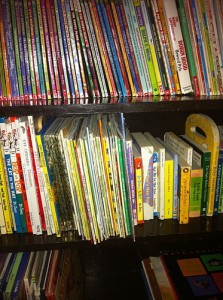Books At Home Can Benefit Your Child’s Literacy
 My son is almost one year old. It will still be a couple of years before he’s reading, but as his father I’ve made sure he already has more books in his minuscule collection than most adults. Why do my wife and I care whether our infant son interacts with a book if he can’t read? And why, if he’s still decades away from reading large tracts of text independently, don’t we accommodate his future reading habits with an electronic reader (iPad, Kindle, tablet, etc.)?
My son is almost one year old. It will still be a couple of years before he’s reading, but as his father I’ve made sure he already has more books in his minuscule collection than most adults. Why do my wife and I care whether our infant son interacts with a book if he can’t read? And why, if he’s still decades away from reading large tracts of text independently, don’t we accommodate his future reading habits with an electronic reader (iPad, Kindle, tablet, etc.)?
Well, my wife and I are voracious readers, and we have always talked about our children inheriting our shared affinity. Now, while it is true that you shouldn’t force your interests on your child, reading is a behavior that positively augments his chances at success, creativity, and fulfillment. Reading too much can also lead him to be that kid that no one wants to hang out with because he smells like soup. Reading excessively might make him not throw a ball in a manly register.
My infant interacts with the world through his mouth, and the salivary informatics he garners. Truth be told, my son’s books are more like pulpy hors d’ouvres at this stage of his development than benign instruments. There is no practical, pragmatic reason we surround him with books, is there? You can’t lay the foundation for a child’s future literacy success by simply surrounding him or her with books, can you?
Well, in 2004, two economists, Roland Fryer and Steven Levitt, authored a study titled, “Understanding the black-white test score gap in the first two years of school.” The study focused on data gathered from the Early Childhood Longitudinal Study, and Fryer and Levitt concentrated on the differences between black and white children exiting kindergarden and entering first grade. Even on entering kindergarden, the difference between black and white children at the start of the year was .40, which meant that black children scored 40% of standard deviation below white children.
When Frye and Levitt manipulated for parent’s occupation and household income the gap dipped to .134, or a little over 13%. But, when they manipulated the date for parent’s occupation, household income, and the number of books in the home, the gap dropped to nearly zero, or -.006.
What this means is that there is a clear correlation between the number of books in the home and how alike minority children and white children score on an exam given at the start of kindergarden.
In other words, the more books in your home, the better prepared your child will be to receive education, and incorporate reading into their repertoire or behaviors. And, if your child is Latino or black, there is even more reason to surround them with books as, statistically, they do not fare as well as their white counterparts. At the best you are preparing your child to know how to decode the world around them, and at the worse you are getting them trained to drop the remote control or joystick every now and then and pick up one of the oldest, most amazing technologies every invented: the book.
Yago Cura is a writer based in Los Angeles. He edits the online journal Hinchas de Poesia and moderates the blog Spicaresque. Follow him on Twitter @theshusher
[Photo By Brandi Jordan]
